Food companies use truly scary ingredients and techniques to make today’s plant-based meat substitutes. To mimic the aromas, flavors and textures of meat, high-tech manufacturing plants need to create copycat proteins, fats, and flavoring compounds. They use genetic engineering to create the key “employees” that do this work: genetically edited e-coli, yeasts, algae, and even stem cells from animals. The job of these genetically engineered micro-employees is to digest and transform big-ag GMO crops into fake meat products for human consumption.
This manufacturing is a franken-fermentation process that generates dangerous waste end-products that need careful handling and complete incineration. They must not escape into our natural environment because the consequences are completely unknown and could be catastrophic.
Large bio-tech companies are investing huge amounts of money to make imitation foods taste like real meats. This is because humans naturally love the taste of meat, eggs, cheese, and fish. Our reliance on meats is bred into our biology. Big tech wants to save us from this “problem.”
In the face of our uncertain future, new food technology is a comfort to some—but where are we putting our faith and trust?
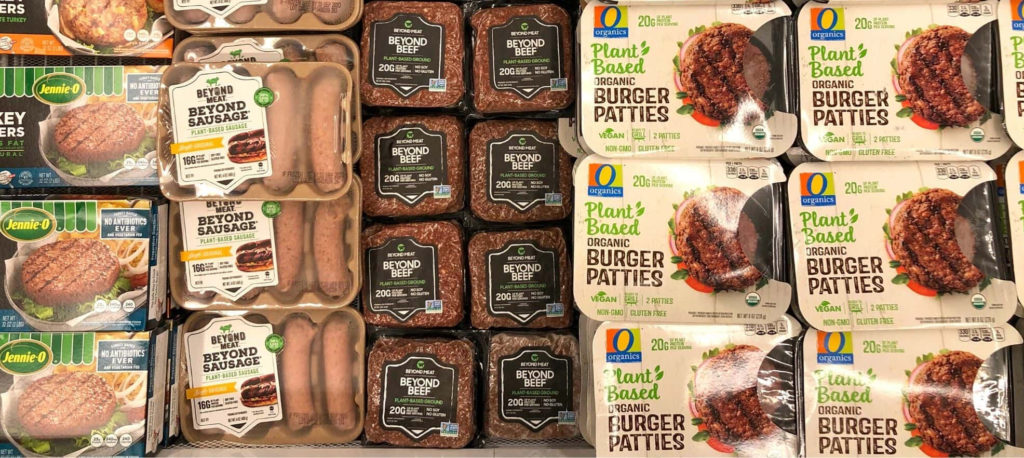
Bio-Tech Brewing
The “synthetic biology” at work here is briefly explained by Alan Lewis, a VP at Natural Grocers, in a 2022 Environmental Health Symposium video, here: https://www.youtube.com/watch?v=lgXbr24JP7k (I attended this conference.)
The manufacturing process is called “gene-edited fermentation” or “precision fermentation” occurring in large bio-hazard lab facilities. The Silicon Valley food-tech entrepreneurs describe their technique as a “proprietary probiotic production process” (terminology from a Berkeley, CA-based company called “Air Protein”, cited in Guthman and Biltekoff, 2020).
Creating micro-organisms that have never been seen on Earth before is a recipe for accidental epidemics of (yet more) untreatable infectious illnesses.
Plant-Based Meats: The Basic Ingredients Come from Industrialized Ag
The base ingredients “feeding” these synthetic manufacturing systems are GMO soy, corn, mung beans, sugar beets, plus hundreds of other additives that create the target microbe metabolite (some sort of novel protein, fat, or flavor compound). The sales hype gushes over these products as a miraculous futuristic achievement and strongly implies that they require no inputs—as if bacteria can produce food out of thin air. This could not be farther from the truth.
The source materials come from GMO farming systems which:
- concentrate the control of food production into corporate hands,
- put small farms out of business,
- destroy soil,
- heavily consume fossil fuels, and
- add many harmful contaminants to our foods, including glyphosate, 2-4-D, and other pesticides.
And to make these “veggie” farm practices even more dangerous, the newest high-tech strategies already in use on farms now include spraying novel genetic materials on plants to trigger expression of selected genes as they grow in our rural countryside. In open-air farming, there is no way to contain the drift and to keep un-intended problems from spreading into natural habits, such as newly invasive superweeds that crowd out native plants!
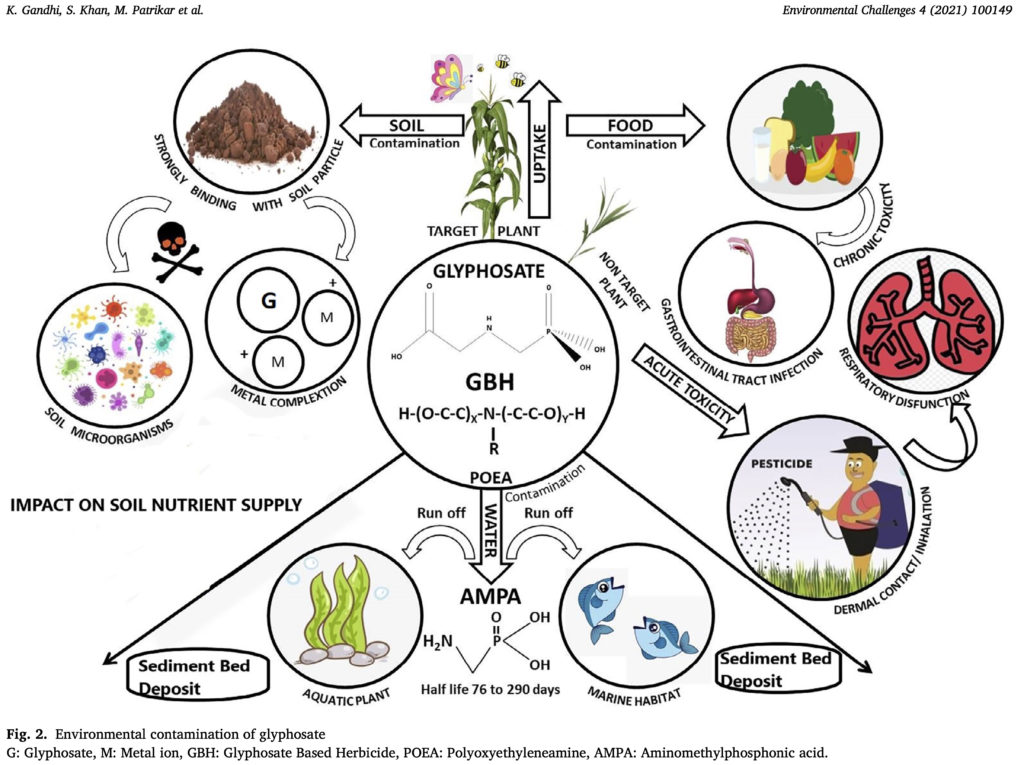
Published by Elsevier; open access article (http://creativecommons.org/licenses/by-nc-nd/4.0/)
The Process: Changing GMO Source Material into Flavors, Fillers, and Proteins
Manufacturers fill bioreactors with a GMO-derived mash of sugars, proteins and gene edited bacteria. Those engineered bacteria are designed not only to produce a target molecule but also for antibiotic-resistance. The bacterial slurry is treated with antibiotics to eliminate the naturally occurring bacteria and select the “edited” micro-organisms to consume the “feed stock” and produce the desired target compound.
Natural vs “Franken”-Fermenting
Traditional use of natural lactic-fermentation (a safe process long in use by humans to create sauerkraut, sourdough bread, beer, and yogurt) is incorrectly referenced to make the “brewing” of GMO grains with manipulated e-coli (a novel pathogen unknown in nature) seem similar and even safe. This is a far cry from reality.
The extracts that go into consumer products likely contain genes and other remnants of the gene-edited pathogens that created them.
“Cellular Meat”
Another human-invented fermentation type is lab-grown altered stem cells from beef, chicken, and pork. Bioengineers edit the genes of animal cells to enable them to survive in the fermentation tanks and grow exponentially fast to keep costs down. They remove the normal growth-regulating genes to bypass the cells’ normal growth limits (a self-regulation process) and to make them thrive on starch and sugar. This creates unregulated anerobic growth—the definition of tumor cells. Basically, this technique creates cancer tissue to be sold as a human food. Fake meat is marketed as superior to real meat, and even claims to be “animal free.”
More Synthetic Foods on the Way, Even for Babies
There’s even a lab-engineered breast milk alternative on the way called Biomilq, which is made from cultured human breast tissue. Bioengineers use a “proprietary cell culture media and growth factors” to stimulate the genetic code that directs the cells to create human casein and lactose as additives for an existing synthetic formula.
Dirtiness of “Clean Tech”
The major products of gene-edited fermentation, however, are massive amounts of “bio-waste” that must be deactivated. The spent synthetic GMO bio-hazard materials, gene edited microbes, antibiotics, and antibiotic resistant novel organisms all need to be incinerated. Misuse or release of these waste products into the environment could cause new disease outbreaks with no way to identify or track them. Regulation is almost non-existent, despite the risks.
Risks At Every Step
Key dangers are:
- the presumption of safety;
- limited surveillance of release controls and cleanup processes;
- the absence of transparency;
- lack of independent examination of the process and products;
- no meaningful regulation;
- no thorough safety review requirement.
The Solution: Better-Informed Consumers
The franken-synthetic realities hide under superior-sounding code names like “plant-based” and behind unproven promises like “planet friendly.” Unless consumers refuse to buy these franken-foods, the creation of cultured meat for the masses on a massive scale can only mean massive and novel environmental problems are in store.
No Real Benefits
Marketers promote these novel technologies as good for the planet. That could not be a bolder lie. As a 2020 academic article (Guthman and Biltekoff) put it, the food-tech entrepreneurs are engaging in “intentional veiling of pernicious processes” as they make grand claims and promises to attract investment capital.
Cultured meats have no environmental benefits. Bioengineers are creating GMO organisms that have never existed on earth before and these organisms and their waste are not even compostable and are certainly not edible. They pose great risks for environmental health for all life on earth, especially human beings.
Perhaps we are all Destined to Live in the Slaughterhouse . . .
The real world-changing ambitions of the bio-tech investors are to: 1) build up a culture that trusts big-tech over mother nature and, 2) to capture wealth and gain the on-going political control that comes with it. This gives them power to de-fang any future consumer protection efforts that might impede their vision of humankind needing near-complete dependence on corporate manufacturing for survival.
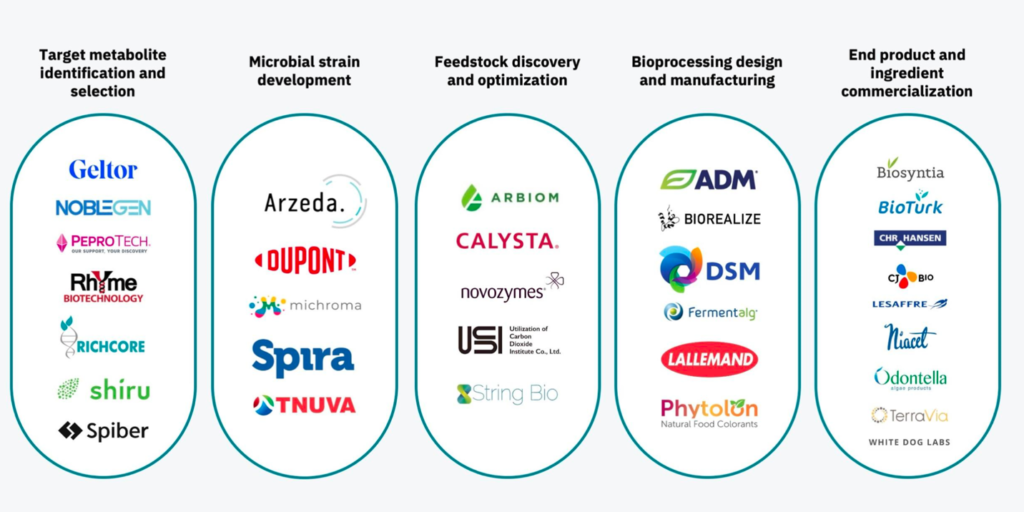
Real Food from Real Farms
There are environmentally beneficial ways to farm. Instead of transitioning into factory laboratories where everything that comes out of them is a biohazard, we need to switch to regenerative farming and support local farms producing real foods using sustainable practices.
We can nourish ourselves by cooperating with nature. Regenerative farming communities—when set up as self-sustaining enterprise zones run and owned cooperatively by the farmers and not technocrats—can sustainably feed all humanity. It’s mostly politics (and big money) that stands in the way.
Please support small family farms not Big-Biotech companies in your food purchasing.
And to get involved in building a brighter future, you can participate in sustainable agriculture education. There are many ways to do this. Start by attending or sponsoring farmers to attend sustainable agriculture conferences. For the business minded, make connections with local leaders working to develop producer-run rural enterprise regenerative farming zones.
In Summary, here are Some Key Points:
E-coli based ferments use bacteria manipulated to be antibiotic resistant.
Lab meats are essentially cancer cells created from animal stem cells.
Neither the gene-edited living organisms, nor the substances that they create have any track record of safety.
Consumers are eating synthetic ingredients and gene-edited animal tumor cells thinking they are “plant-based” and “animal free.”
They are also likely eating virulent pathogens.
The waste products of these lab-factories pose health risks for all people, beyond those who elect to eat these foods (a choice typically made from ignorance).
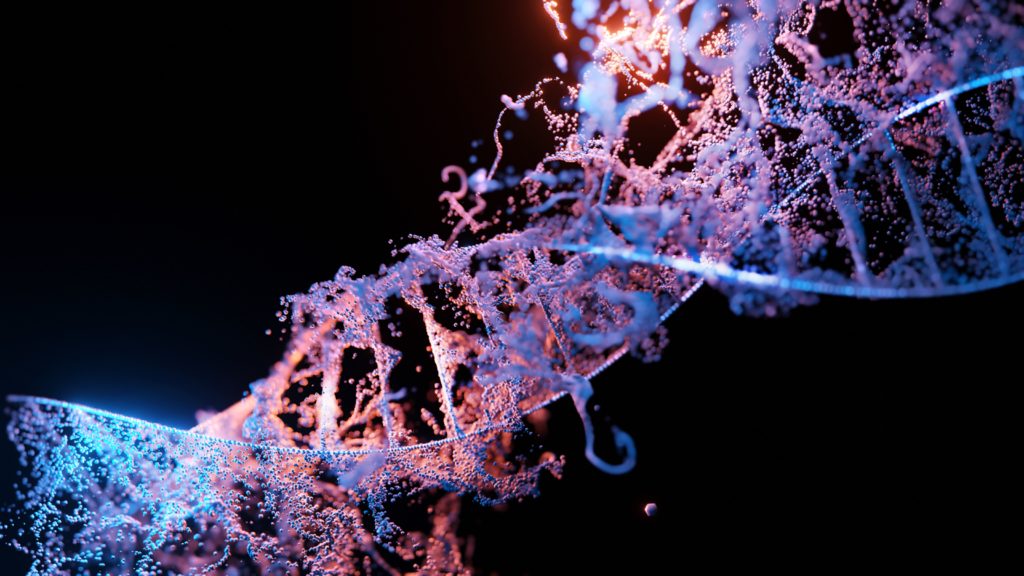
Image by Sangharsh Lohakare on Unsplash
About Alan Lewis (from the video link)
Alan Lewis is based in Colorado. He has served various trade organizations: Non-GMO Project board, Organic and Natural Health Association board, Real Organic Project standards board, Retail Advisory Committee of the American Grassfed Association (certification program for grassfed producers), Farm Policy Committee of the Organic Farmers Association, and various committees of the Council for Responsible Nutrition (a leading trade association for the dietary supplement and functional food industry).
In addition to Alan Lewis’ talk, this article also references:.
Wuench, J. Got Milk! BIOMILQ Is The First Company To Create Human Breast Milk In A Lab. Forbes. https://www.forbes.com/sites/juliawuench/2021/06/01/got-milk-biomilq-is-the-first-company-to-create-human-breast-milk-in-a-lab/.
Guthman, J., and Biltekoff, C. (2021). Magical disruption? Alternative protein and the promise of de-materialization. Environment and Planning E: Nature and Space 4, 1583–1600. 10.1177/2514848620963125.
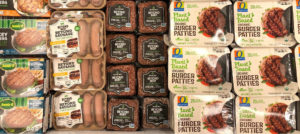
Good summary. Eating fake meat is like eating cancer burgers.
I wanted to express my gratitude for bringing much-needed attention to the issue of Frankenfoods.
It’s a dismal reality when artificial lab-made substances are touted as superior to the wholesome, nourishing foods that nature has to offer. Thank you for all your hard work in this arena – your efforts are truly appreciated.